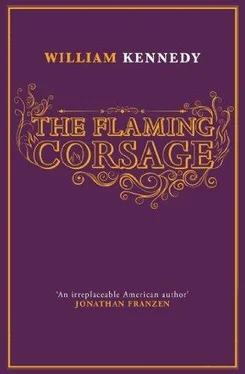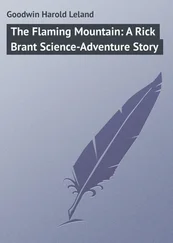William Kennedy
The Flaming Corsage
Here’s a how-de-do!
If I marry you,
When your time has come to perish,
Then the maiden whom you cherish
Must be slaughtered, too!
Here’s a how-de-do!
. . .
With a passion that’s intense
I worship and adore,
But the laws of common sense
We oughtn’t to ignore.
If what he says is true,
’Tis death to marry you!
Here’s a pretty state of things!
Here’s a pretty how-de-do!
— Gilbert and Sullivan, The Mikado
The Love Nest, October 17, 1908
WHEN THE HUSBAND made his surprise entrance into the Manhattan hotel suite, his wife was leaning against a table, clad in a floor-length, forest-green velvet cloak, and wearing a small eye mask of the same color, her black hair loose to below her shoulders.
The second woman, her light-brown hair upswept into a fuss of soft curls that bespoke an energetic nature, and wearing a floor-length, peach-colored evening gown embroidered with glass pearls, was in conversation with the man who had rented this suite months earlier, and who at this moment was wearing a frock coat, evening trousers, wing collar, gray ascot and pearl stickpin, the two dressed as if for a social evening. They were standing near the window that gave a view at dusk of the falling leaves and barren branches of the elms and maples of lower Fifth Avenue.
The husband’s entrance to the suite was made with a key. How he came into possession of the key has not been discovered. The husband spoke first to his wife, saying, according to one witness, “You Babylonian whore, everything is undone”; or, according to the other witness, “Babylon, regina peccatorum , you are gone.” Turning then to both the man in the wing collar and the second woman, the husband spoke of “traitors” and “vixen,” his exact phrase unclear to both witnesses. The husband then opened his coat, drew a.45-caliber Colt revolver from his waistband, parted his wife’s cloak with its barrel, placed the barrel against her left breast, and shot her precisely through the heart. The position in which she fell onto the carpet revealed that she wore nothing beneath the cloak.
The husband turned to the man by the window and fired two shots at him, hitting him with one, the force of which propelled him backward into the windowpane, which shattered. The second woman screamed, ran into the bedroom, and locked its door. The wounded man watched the husband staring at his pistol and heard him mumble, “Confido et conquiesco,” which translates from the Latin as: I trust and am at peace. After saying this, the husband put the revolver barrel under his chin, pulled the trigger, and fell dead beside his exposed wife.
Edward in the City of Tents, September 1885
IT WAS THE year the State Fair came to Albany, and as Edward Daugherty walked through the vast city of tents and impromptu structures that had sprung up in a matter of weeks at the Fairgrounds on the Troy Road, he felt a surge of strength, a certainty that he was changing substantially, at the breaking dawn of a creative future.
He could see the tents on the midway where seven newspapers had their offices and seven sets of reporters wrote yards of daily copy about Shorthorns and Clydesdales, Cotswold sheep, and Poland China swine. In the Albany Evening Journal ’s tent he found Maginn writing at a table.
“What news do you have of the swine?” Edward asked.
“What a coincidence that you ask,” Maginn said, and he thrust what he was writing at Edward, who read:
Country maidens in their best bib and tucker shot coy glances at robust lads of brawny arm and sun-browned face as a brilliantly sunny day brought thousands to the midway of the Fair yesterday. Flirtations were numerous and many lords of creation succumbed before batteries of sparkling eyes.
“Splendid,” said Edward, “but what about the swine?”
“They are the swine,” said Maginn.
Edward was twenty-six, dark-haired and tall, considered by women young and old to be the handsomest of men. Thomas Maginn, lanky and lean at twenty-eight, was considered a ragtail beanpole with an acid tongue. The two worked for rival Albany newspapers, Maginn on The Journal , Edward on The Argus , had known each other a year, but now, as working rivals on the Fair’s midway — better than a circus, as all knew — they had tested each other’s attitudes toward this instant city and were impressed with its two miles of stables, its racetrack, its complete farm, its vast Hall of Machinery with the latest thermostatic chicken incubators, potato diggers, sulky plows, and typewriters, the oyster pavilion, the temporary lockup/courtroom where troublemakers won swift justice, and the curiosities — the solid-silver razor, the huge pyramid of sacked salt, the embalmed dog in a casket.
“A confected metropolis,” Maginn had called the Fair, and Edward agreed that its rapid construction, and its appeal to both the elite and the crowd, reflected a creativity that could harmonize the wonders of existence with a flick of the mind. To such creation both young men aspired, seeing themselves as citizens of a world beyond newspapers. Edward had graduated with honors from Albany Academy and Columbia College. Maginn had been expelled from Columbia for drunkenness in his sophomore year, an autodidact ever since.
“Luckiest day of my life when they kicked me out,” he said. “Unburdened forever of pedants and pederasts.”
One night after the Fair closed, Maginn cajoled Edward into joining him at the Freethinkers convention at the Leland Opera House in Albany for a lecture on “The Aristocracy of Free Thought,” and they heard a man named Palmer aver that “a true gentleman would always embrace the highest forms of culture and contribute most to the good of his fellowmen. And the true gentleman will maintain that woman’s consent is as requisite as man’s.”
“I don’t know as that’s necessary,” Maginn whispered.
“The best must rule,” Palmer declaimed. “No man can prevail among the true elect if he remains imprisoned in the bastille of a dwarfing environment.”
Just such an environment, Maginn said, he and Edward inhabited as Albany newsmen, but only temporarily. Edward was about to publish a novel, The Mosquito Lovers (about Irish convict laborers as expendable martyrs in the building of the Erie Canal, men who elected to risk a dig through malarial swampland rather than rot their souls in jail). Maginn regularly published reviews of fiction and belles lettres in the Atlantic Monthly , had just finished revaluing Melville’s The Confidence-Man as an underrated work on human treachery, and was writing a novel.
This imminence of large-minded success convinced the young men they were vastly smarter than the run of Fairgoers, including their fellow reporters, and would soon inhabit a lofty perch in America’s high culture. Maginn had shown Edward his Melville essay. Edward’s response was “Well written but perfunctory. It would improve if you didn’t view your own opinions as unmatched in human thought.” Edward let Maginn read his novel in manuscript. Maginn found it “seriously wanting as fiction, but you write such effective dialogue you should be a playwright.”
This critical honesty formed a bond of truth-telling between them, and their friendship deepened when they found they could talk to each other about anything at all.
As they strolled the trim rolling field that came down from the western rise of the valley, they eyed passing females and tried to recall all women they had ever desired. Maginn observed that a voluptuous woman was the greatest gift the universe offered to an imaginative man, a statement that seemed true to Edward; but the word “voluptuous,” “How do you define it, Maginn?”
Читать дальше












